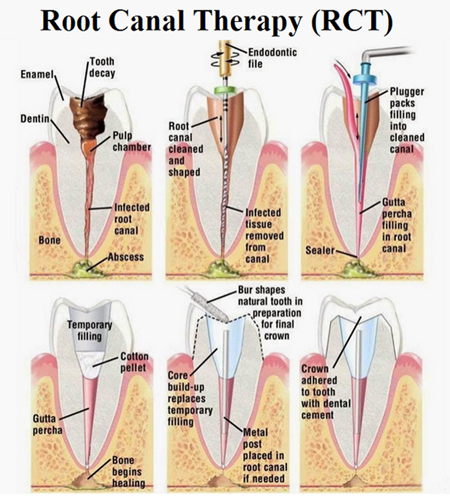A. If the pulp becomes infected, this may eventually lead to an abscess and without root treatment, the tooth should be taken out to prevent spread of the infection.
A. No. Using a local anaesthetic, it should feel no different to having an ordinary filling done.
A. The aim of the treatment is to remove all infection from the root canal. A time-consuming procedure that requires intricate skill, the root is then cleaned and filled to prevent any further re-infection. Most courses of treatment involve 1 or 2 visits to your dentist of 1 to 2 hours.
The root canal is cleaned and shaped ready for the filling, and a temporary filling may be placed to allow the tooth to settle, before the tooth is permanently filled. Using a microscope to see into the root canals is a great help to produce high-quality work, so do not be worried about when your dentist uses a microscope.
A. A root-filled tooth can darken after treatment. If there is any discoloration, there are several treatments available to restore the natural appearance such as a crown or veneer.

A. Root canal treatment is usually very successful. However, if the infection comes back, the treatment can be repeated. This is often done best by a dentist, with a special interest in endodontics, who uses an endodontic magnifying microscope. This is available at our dental practice as part of our commitment to making the most modern technology available to our patients. Less than 10% of practices in England have this microscope.
A. The alternative is to have the tooth extracted. Once the pulp is destroyed, it cannot heal and it is not recommended to leave an infected tooth in the mouth. Although some people would prefer an extraction and not have a root filling, it is usually best to keep as many natural teeth for as long as possible.
A. Yes. However, the procedure is usually carried out on very heavily filled or broken-down teeth and the procedure itself somewhat hollows the tooth thereby weakening it. We know a percentage of root-filled teeth can snap off at the gum line as a complication post-treatment. It is better to restore the tooth with a crown to provide extra support and strength to the tooth.
A. Root canal treatment is a routine dental procedure, which your dentist will be happy to do for you.
A. Root-treated teeth should be treated just the same as any other tooth. However, you may receive advice to avoid hard foods if the tooth is particularly weakened, especially in patients who have spaces or reduced numbers of teeth, or the root-filled tooth is a bridge or denture support. Unfortunately, the root filling procedure is not 100% successful over greater than 5 years, and patients should be counselled against unrealistic expectancy for what is a considerable investment in their teeth.





Fields with (*) are required.
Please contact us via this website or email without disclosing confidential information.
277 High Street, Dorking, Surrey RH4 1RY
Call us today: 01306 885611
Email: [email protected]
| Monday | 8.00 am - 17.30 pm |
| Tuesday | 8.00 am - 17.30 pm |
| Wednesday | 8.00 am - 19.00 pm |
| Thursday | 8.00 am - 16.00 pm |
| Friday | 8.00 am - 16.00 pm |
| Alternate Saturday | 9.00 am - 13.00 pm |
| Sunday | Closed |